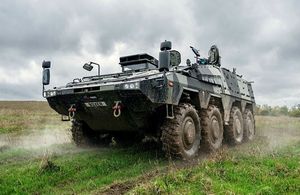100 extra Boxer vehicles for the British Army
Boxer armoured vehicle programme boosted to 623 vehicles as joint UK-Germany production begins in Telford, Stockport and Munich

- Delivering on the Integrated Review and maintaining close UK-German defence ties
- Programme supports up to 1,000 UK jobs
The British Army will receive 100 extra armoured Boxer vehicles, ensuring more vehicles reach the frontline faster and bolstering the programme to a total of 623, as the UK maintains defence ties with Germany, the Prime Minister has announced today.
The modern digitalised armoured vehicles can be used to transport troops to the frontline and can be rapidly reconfigured to fulfil different roles on the battlefield.
The UK and Germany have worked closely together on the Boxer programme for the British Army, with the Boxer build in the UK benefitting from German expertise, data and collaboration.
Now boasting more than 400 Boxer vehicles themselves, Germany has had older variants of the vehicle in service for more than 10 years, including service in Afghanistan. Their success in the German Army means they continue to develop new variants of the vehicle.
Prime Minister Boris Johnson said:
In these difficult times, our deep defence partnership offers reassurance to our people and the wider world, while also ensuring we are ready to respond to new threats.
This joint programme will ensure our militaries have state-of-the-art equipment as the invasion of Ukraine shakes the very foundations of European peace and security.
Boxer production for the British Army is underway. The first 117 vehicles are being built on German production lines, as UK facilities in Telford and Stockport ramp up for the remaining 506 and begin manufacture.
The first Boxer vehicles will arrive in units from 2023, with the overall programme protecting up to 1,000 jobs nationally, enhancing skill sets and creating an ambitious UK apprenticeship scheme.
Defence Procurement Minister, Jeremy Quin said:
This order will accelerate the delivery of the Boxer fleet to the British Army and increase its numbers.
The land equipment upgrade is a vital element of the Integrated Review, on which we continue to deliver. Doing so, alongside our German allies, creates opportunities for both our Armed Forces.
As an addition to the £2.8 billion contract announced in 2019, manufacture of the additional vehicles will commence shortly. UK production is focused in Telford through Rheinmetall BAE Systems Land (RBSL), and Stockport through WFEL, with supply chain sub-contracts across the UK, including in Glasgow with Thales.
Deputy Chief of the General Staff, Lieutenant General Sir Christopher Tickell KBE said:
This is a significant announcement for the Army in enhancing this key capability under the Integrated Review. Boxer will form the core of our modernised Armoured Brigade Combat Teams and it is great news for our service personnel getting more of these excellent platforms as part of delivering Future Soldier, whilst investing in the UK’s defence industry and supply chains.
Enhancing and accelerating Boxer production ensures warfighting remains at the heart of the British Army and today’s announcement reaffirms our threat-led approach, as outlined in the Integrated Review.
Background
- The UK announced in 2018 that it would re-join the Boxer programme with OCCAR (Organisation Conjointe de Coopération en matière d’Armement / Organisation for Joint Armament Co-operation) to explore options to modernise its vehicle fleet to meet the Army’s Mechanised Infantry Vehicle requirement.
- These extra vehicles will be produced in both UK and Germany whilst full production transfers to the UK. Production will source and sustain expertise and components from the already maturing and expanding UK supply chain, supporting the initial batch of 523 placed in 2019.
- The UK played a central role in the original design, development and testing of the Boxer, beginning in 1998. In re-joining the programme in 2019, the UK reassumed the rights it had as a project partner.
- The cost of the additional vehicles will not be published for commercially sensitive reasons.